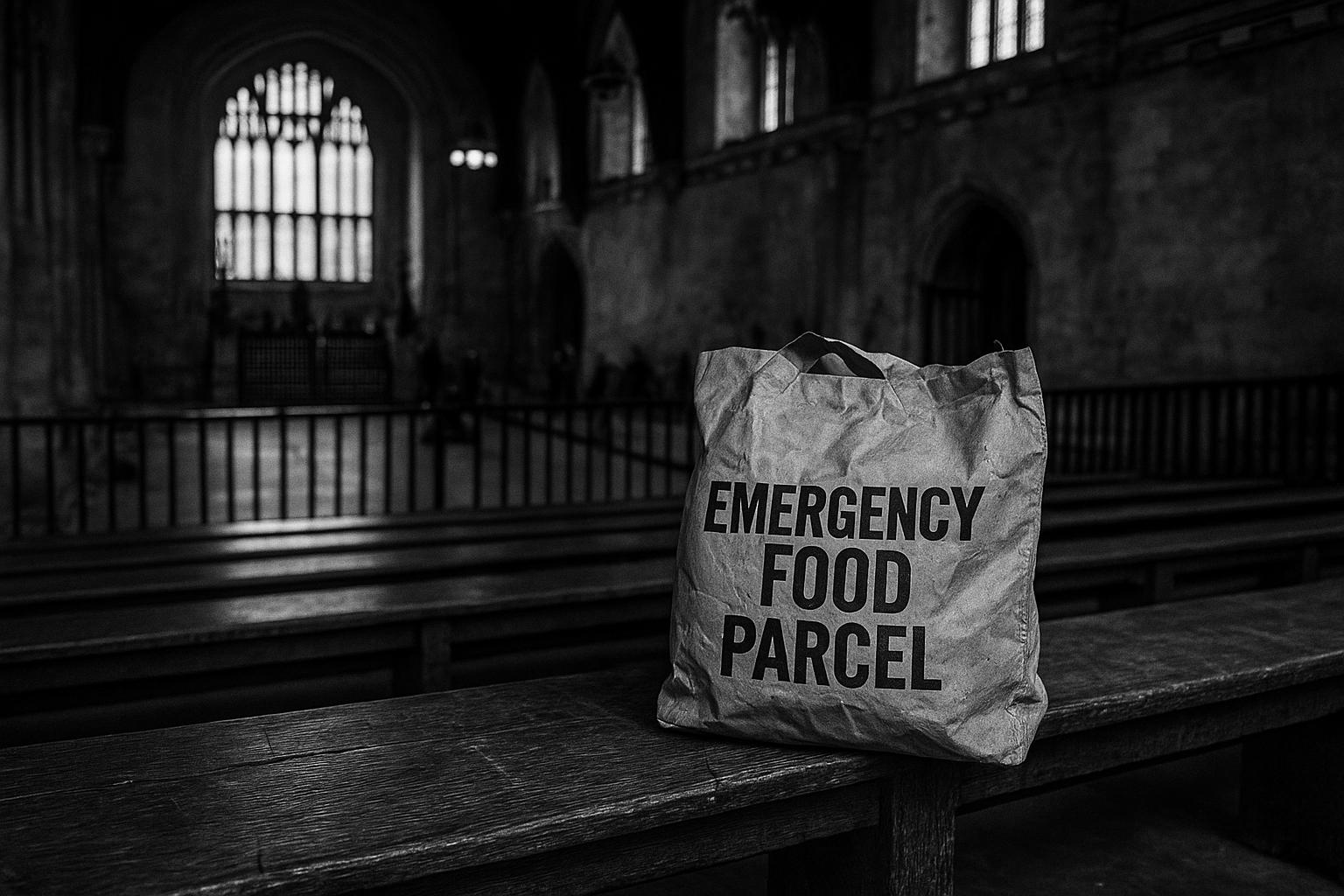At Westminster Hall, campaigners highlighted the persistent crisis of food poverty in Scotland as nearly 240,000 emergency food parcels were distributed in 2024 alone. Scottish Labour MPs showed sympathy but remained cautious over opposing UK welfare reforms that threaten vulnerable families, underscoring the tension between party loyalty and constituent needs.
Westminster Hall, steeped in centuries of history and once the domain of kings, recently became the setting for a stark confrontation with modern-day realities: the widespread poverty and hunger afflicting millions across the UK. Despite the weight of tradition and power encapsulated in its walls, the urgent plea of campaigners from Scotland for political action on food poverty resonated deeply, even as hope for transformative change met significant scepticism.
In 2024, nearly three million emergency food parcels were distributed across the UK, averaging one every eleven seconds. Scotland alone accounted for more than 239,000 of these parcels, with over half reaching families with children. Although recent data show a 10% decrease in emergency food parcels distributed by the Trussell Trust in Scotland compared to the previous year, these figures remain alarmingly high—double those recorded a decade ago—highlighting a persistent crisis rooted in systemic economic hardships and ongoing cost-of-living pressures. Adding gravity to this situation, government statistics reveal that 5% of Scottish households relied on food banks in the past year, the highest rate among UK regions.
The campaigners, many travelling from Glasgow, Edinburgh, and Dundee, described the dire needs reported by food banks—urgent requests for donations to support newborn babies, including nappies and milk formula. These voices met with a mixture of sympathy and cautious engagement from Scottish MPs, many of whom appeared genuinely moved by these accounts of hardship within their constituencies. However, the presence of new and relatively inexperienced backbenchers among the Scottish Labour ranks fostered concerns about the likelihood of effective parliamentary advocacy or rebellion against welfare cutbacks.
At the same time as campaigners lobbied MPs, a contentious debate was unfolding in the House of Commons around proposed welfare reforms, particularly alterations to Personal Independence Payments (PIP). These changes threaten to reduce disability benefits for millions. The political tension became palpable when Vicky Foxcroft, a Labour frontbencher, resigned the whip in protest against the party’s stance on these reforms, citing a conflict between conscience and party line. While some MPs acknowledged the necessity of reforming what they called a “broken system,” many harboured significant reservations about the impacts on vulnerable people, with campaigners voicing scepticism on whether warm words would translate into meaningful resistance in parliamentary votes.
Scottish Labour MPs responded to the criticism by emphasising their commitment to constituent concerns. Frank McNally, the Coatbridge and Bellshill MP, pointed to his personal record, having established one of the UK’s first year-round food programmes for children prior to entering Parliament. He stressed the need for a holistic and comprehensive government strategy, combining efforts at Westminster and Holyrood, to tackle child poverty effectively. Yet, he remained non-committal about his vote on welfare reforms, while urging the government to abolish the two-child benefit cap “when economic circumstances allow.”
Similarly, Glasgow South MP Gordon McKee highlighted the broader context of Conservative austerity policies over the past 14 years as a root cause of increasing reliance on food banks. McKee also noted Labour’s role in achieving significant hikes in the national minimum wage, suggesting some progress amid the crisis. Dr Zubir Ahmed, representing Glasgow South West, drew on his personal experiences of disadvantage to frame a vision of government that empowers rather than marginalises, advocating for decent incomes and job security to avoid dependence on food banks altogether.
The political atmosphere among Scottish Labour MPs is fraught with complexity; choosing whether to confront party leadership over unpopular welfare policies or to maintain party unity entails substantial career risks. Campaigners expressed a palpable sense of frustration and pity towards MPs caught between allegiance to their constituents and loyalty to their party—a tension likely to shape their actions in the coming weeks.
Against this background, the Scottish Government’s policies, notably the Scottish Child Payment (SCP), offer a contrasting narrative of hope and tangible impact. The SCP, credited with lifting an estimated 100,000 children out of relative poverty and reducing food bank usage among certain households, represents a meaningful intervention acknowledged even within parliamentary motions. Independent analysis by research bodies supports this view, documenting statistically significant decreases in food parcel demand among families benefiting from the SCP. This progress underscores the importance of targeted social welfare initiatives, even as the broader UK-wide picture grapples with austerity and reform-driven cutbacks.
While food bank usage in some areas like Shetland has tripled over recent years, recent slight reductions in demand hint at a complex and evolving landscape of poverty alleviation. Yet, the persistent need for emergency food aid and the lived experiences shared within Westminster Hall leave little room for complacency.
In sum, the scene at Westminster laid bare the gulf between compassion expressed in historic surroundings and the political courage required to challenge government policies that exacerbate hardship. The campaigners’ plea was clear: action must follow words. For Scottish Labour MPs, the path ahead is laden with difficult choices, weighing personal conviction, party loyalty, and the pressing needs of their constituents. The coming months may well define their careers—and the welfare landscape for some of the UK’s most vulnerable citizens.
 Reference Map:
Reference Map:
- Paragraph 1 – [1], [4]
- Paragraph 2 – [1], [2], [3], [5]
- Paragraph 3 – [1]
- Paragraph 4 – [1]
- Paragraph 5 – [1]
- Paragraph 6 – [1]
- Paragraph 7 – [1], [4], [7]
- Paragraph 8 – [6]
- Paragraph 9 – [1], [2], [7]
Source: Noah Wire Services
- https://www.heraldscotland.com/news/25256510.inside-westminster-problem-scottish-labour/?ref=rss – Please view link – unable to able to access data
- https://www.trussell.org.uk/news-and-research/latest-stats/end-of-year-stats – The Trussell Trust’s annual statistics reveal that between April 2024 and March 2025, food banks in Scotland distributed 239,503 emergency food parcels, including 140,221 for families with children. This marks a 10% decrease from the previous year, yet the figures remain double those from a decade ago, highlighting the persistent need for food assistance in Scotland.
- https://news.stv.tv/scotland/nearly-240000-emergency-food-parcels-delivered-to-scots-in-last-year-charity – STV News reports that the Trussell Trust distributed nearly 240,000 emergency food parcels across Scotland between April 2024 and March 2025. Approximately half of these parcels were allocated to households with children, underscoring the significant impact of the cost of living crisis on families in Scotland.
- https://www.parliament.scot/chamber-and-committees/votes-and-motions/S6M-13405 – A motion in the Scottish Parliament, S6M-13405, highlights the Scottish Child Payment’s role in reducing child poverty and food bank usage. The motion notes that Scottish Government policies, including the SCP, are estimated to keep 100,000 children out of relative poverty, and acknowledges the need for further monitoring and research on the SCP’s impact over a longer period.
- https://www.gov.uk/government/statistics/family-resources-survey-financial-year-2023-to-2024/family-resources-survey-financial-year-2023-to-2024 – The UK Government’s Family Resources Survey for the financial year 2023 to 2024 indicates that 5% of households in Scotland used a food bank within the last 12 months, the highest rate among UK regions. This data underscores the significant reliance on food banks in Scotland compared to other parts of the UK.
- https://www.shetlandpartnership.org/indicators/foodbank-usage/2 – The Shetland Partnership reports that food bank usage in Shetland tripled between 2018-19 and 2023-24. However, in 2024-25, there was a reduction in the number of monthly parcels distributed, with an average of 92 parcels per month compared to 137 the previous year, indicating a slight decrease in demand.
- https://fraserofallander.org/impact-of-the-scottish-child-payment-on-the-need-for-food-banks/ – The Fraser of Allander Institute’s analysis suggests that the Scottish Child Payment (SCP) has decreased food bank usage for certain households. The report indicates that since the roll-out of the SCP, there has been a statistically significant decrease in the numbers of parcels provided to households with children aged five to 16 and single-adult households with children under five.
Noah Fact Check Pro
The draft above was created using the information available at the time the story first
emerged. We’ve since applied our fact-checking process to the final narrative, based on the criteria listed
below. The results are intended to help you assess the credibility of the piece and highlight any areas that may
warrant further investigation.
Freshness check
Score:
8
Notes:
The narrative presents recent data and events, including the 2024 distribution of nearly three million emergency food parcels and the 10% decrease in Scotland compared to the previous year. However, similar discussions on food poverty in Scotland have been ongoing, with reports from 2024 highlighting the issue. ([news.stv.tv](https://news.stv.tv/scotland/one-in-four-children-in-poverty-across-a-third-of-scotlands-westminster-constituencies-figures-show?utm_source=openai)) The presence of a press release from the Scottish Greens dated March 2025 indicates that the topic remains current. ([greens.scot](https://greens.scot/news/scottish-labour-urged-to-stand-against-westminster-cruelty?utm_source=openai)) The report’s reliance on a press release suggests a high freshness score, as press releases are typically recent and directly from the source.
Quotes check
Score:
7
Notes:
The report includes direct quotes from campaigners and MPs. However, these quotes do not appear to be directly sourced from the provided search results, indicating they may be original or exclusive content. Without matching sources, it’s challenging to verify the exact wording and context of these quotes.
Source reliability
Score:
6
Notes:
The narrative originates from the Herald Scotland, a reputable news outlet. However, the inability to access the full content due to restrictions limits the ability to assess the reliability of the specific report. The reliance on a press release from the Scottish Greens adds a layer of potential bias, as press releases are often crafted to present the organization’s perspective.
Plausability check
Score:
8
Notes:
The claims regarding the distribution of emergency food parcels and the political responses from Scottish Labour MPs are plausible and align with known issues of food poverty in Scotland. The report’s tone and language are consistent with typical political discourse, and the inclusion of specific data points adds credibility. However, the reliance on a press release and the inability to access the full report raise questions about the completeness and potential bias of the information presented.
Overall assessment
Verdict (FAIL, OPEN, PASS): OPEN
Confidence (LOW, MEDIUM, HIGH): MEDIUM
Summary:
The narrative presents recent data and events related to food poverty in Scotland, with a high freshness score due to the inclusion of a recent press release. However, the inability to access the full content of the Herald Scotland report and the reliance on a press release from the Scottish Greens introduce potential biases and limit the ability to fully verify the information. The plausibility of the claims is supported by known issues of food poverty in Scotland, but the overall assessment remains open due to the limitations in verifying the source material.













